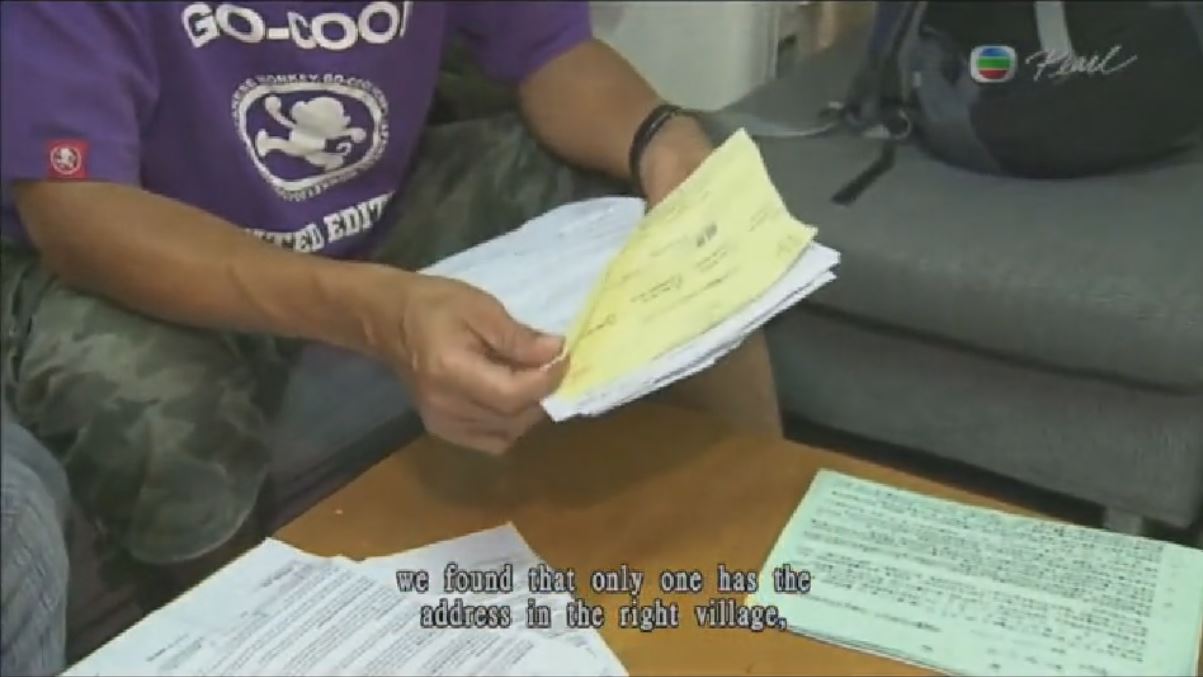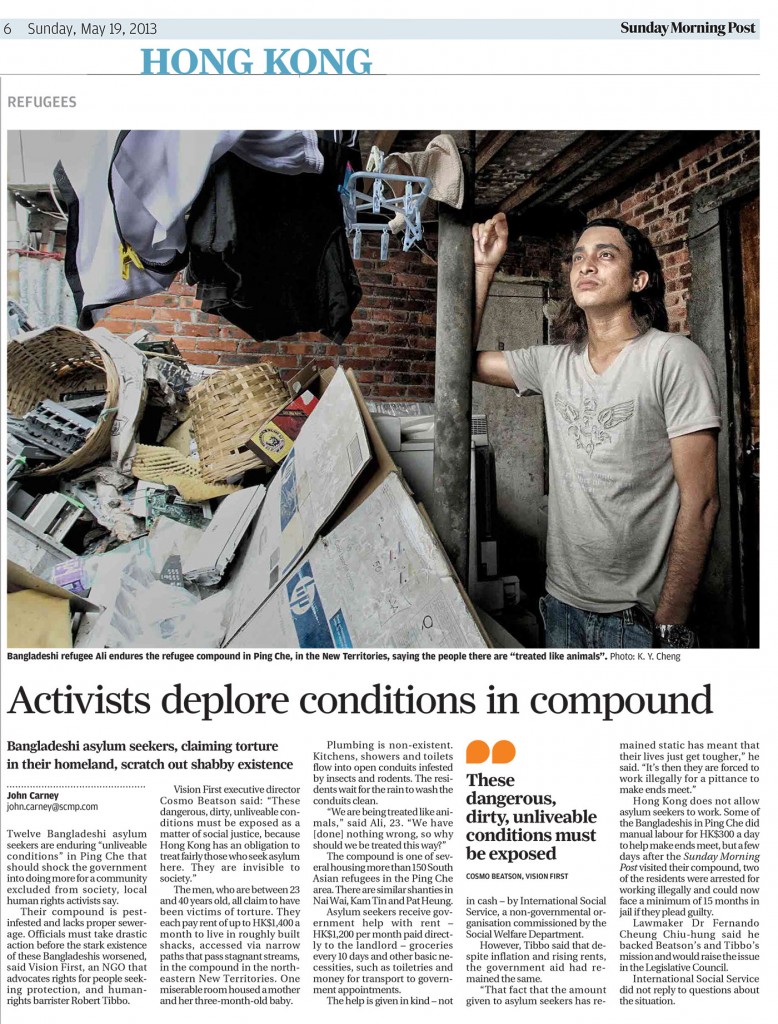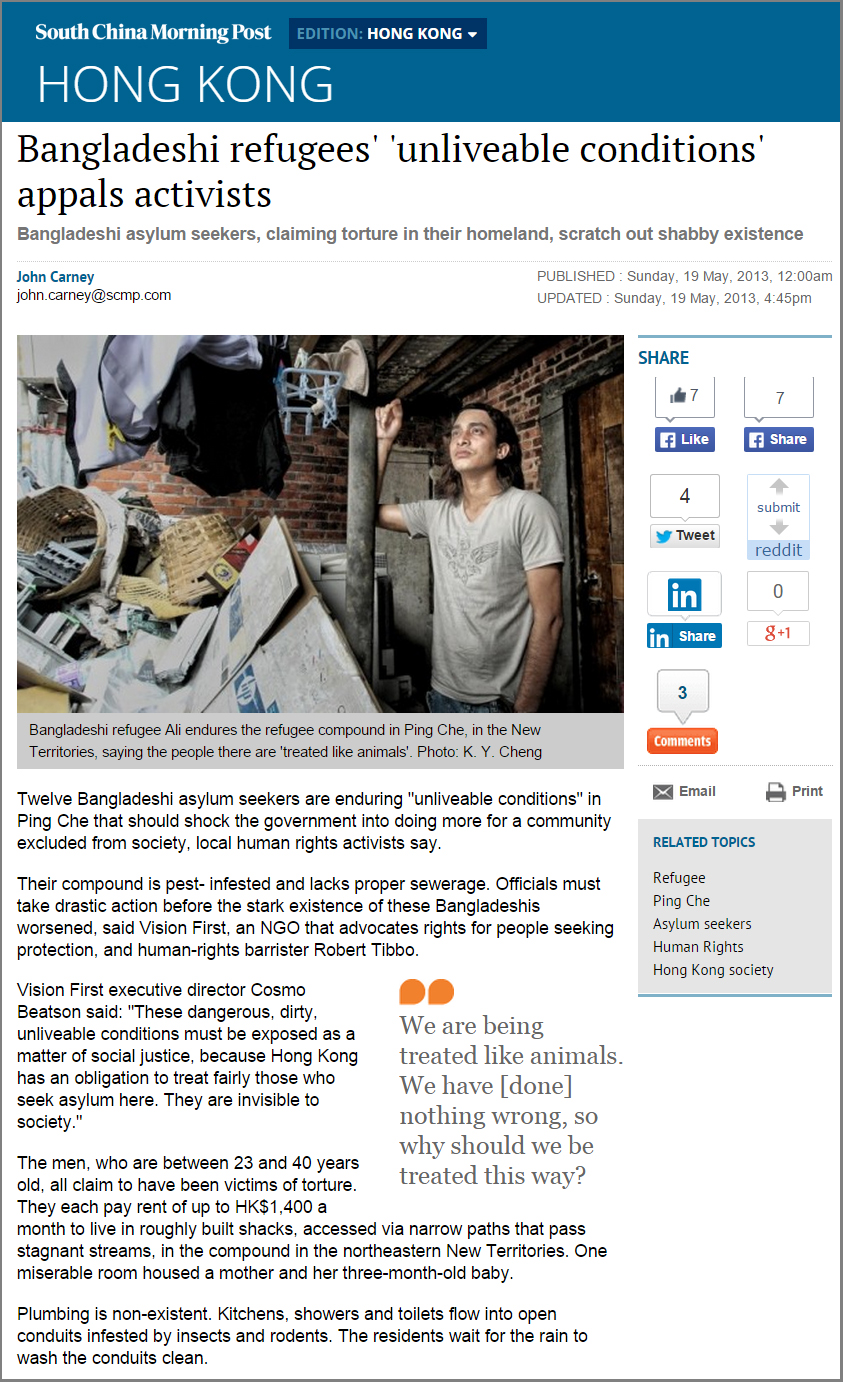Archive
Fernando Cheung calls Welfare Panel meeting at Legco
Jun 25th, 2013 | VF updates, programs, events | Comment

ISS retreats from the slums at the sight of TVB camera
Jun 25th, 2013 | Advocacy | Comment

Vision First warmly welcomes any TV crew to film our outreach work – by suprise
Under Chinese gods
Jun 22nd, 2013 | Advocacy, Media | Comment
A Bangladeshi refugee rests under an altar for Chinese gods in front of his shack rented from a Chinese landlord inside a quarters at the rural Ping Chi in Hong Kong’s New Territories June 19, 2013. According to Vision First, a local non-governmental organization (NGO) supporting Hong Kong-based refugees, about 150 Bangladeshi asylum seekers and torture claimants reside in that area, suffering one of the worst conditions among thousands of refugees in the territory. Refugees in Hong Kong are not allowed to work, with the government paying HK$1,200 ($154) rent directly to the landlord. – REUTERS/Bobby Yip


Bangladeshi refugee Mdmozibur Rahman, 42, pictured beside his Indonesian wife Muslimah in their shack
TVB exposes ISS’ suspicious contracts
Jun 21st, 2013 | Advocacy, Media | Comment
Vision First voices the concerns of refugees who express their disappointment with ISS service and want to press Hong Kong Government to increase social support to a level where their basis financial and material needs are met. In this respect, we will press these demands on ISS and continue to expose the unsatisfactory service in all forums, until adequate assistance is provided to refugees who have neither savings, nor the right to earn a living.
1. Refugees are provided agreements in which both parties agree on the stated level of assistance. As many refugees indeed do not agree: Why does ISS issue “Agreements” and not “Notices? Why is rental assistance ordinarily capped at 1200$? Why aren’t home deposits paid when this is a basic requirement in the local market? How are refugees expected to move out of slums without money? What has ISS done to change rent and deposit restrictions with the government?
2. ISS contracts in the slums often show addresses different from where refugees live. ISS stated “The landlords in New Territories have document proof to show approval by the Lands Department for the structures in their properties.” Further ISS said refugees approach them for assistance when they already have a room and need help with rent: How and with whom does ISS check these documents? Isn’t ISS professionally bound to verify proof of ownership (with full address, not lot number) before authorizing the disbursement of government funds? Isn’t it ISS policy to ask clients to find a place themselves before ISS visits and confirms payment? Doesn’t ISS expect refugees to secure a room and pay the first month rent before paying the second month? How does ISS explain the discrepant contract address for clients ISS visited in the same compound?
3. ISS might argue that at times landlords falsify documents in order to receive payments for lodging refugees in other places. This would be a criminal offence. Doesn’t ISS have a professional duty to safeguard the wellbeing, and legal arrangements, of clients while their asylum claims are being processed? Why does ISS aid and abet the exploitation of refugees by slum landlords? ISS stated “Our staff are in contact with the landlords, during the negotiation for the rent and mode of payment and in handling clients and landlords’ concerns.” Is ISS complicit in these suspicious transactions for expedient and cost-saving reasons? ISS stated “ISSHK assists in … equipping the place with basic cooking and sleeping furniture and equipment.” Why do refugees complain they don’t have stoves and fridges?
4. ISS stated “clients are provided a forum to individually discuss their concerns with their caseworkers.” What tangible actions has ISS taken to deal with refugees’ complaints? If ISS is a true humanitarian agency, how does it justify its execution of an unfair, unsafe and inhumane policy that causes refugees extraordinary hardship without viable survival options? Isn’t it morally objectionable to promote a cruel government policy that perpetuates and exacerbates refugee suffering? Why doesn’t ISS rescind its contract with a government that punishes asylum seekers?

TVB reports on illegal structures and dodgy rental contracts in Ping Che slums
Refugees’ shabby compound appals activists
May 19th, 2013 | Advocacy, Media | Comment
John Carney writes for South China Morning Post on 19 May 2013
Bangladeshi asylum seekers, claiming torture in their homeland, scratch out shabby existence
Twelve Bangladeshi asylum seekers are enduring “unliveable conditions” in Ping Che that should shock the government into doing more for a community excluded from society, local human rights activists say. Their compound is pest- infested and lacks proper sewerage. Officials must take drastic action before the stark existence of these Bangladeshis worsened, said Vision First, an NGO that advocates rights for people seeking protection, and human-rights barrister Robert Tibbo. Vision First executive director Cosmo Beatson said: “These dangerous, dirty, unliveable conditions must be exposed as a matter of social justice, because Hong Kong has an obligation to treat fairly those who seek asylum here. They are invisible to society.” The men, who are between 23 and 40 years old, all claim to have been victims of torture. They each pay rent of up to HK$1,400 a month to live in roughly built shacks, accessed via narrow paths that pass stagnant streams, in the compound in the northeastern New Territories.
One miserable room housed a mother and her three-month-old baby. Plumbing is non-existent. Kitchens, showers and toilets flow into open conduits infested by insects and rodents. The residents wait for the rain to wash the conduits clean. “We are being treated like animals,” said Ali, 23. “We have [done] nothing wrong, so why should we be treated this way?” The compound is one of several housing more than 150 South Asian refugees in the Ping Che area. There are similar shanties in Nai Wai, Kam Tin and Pat Heung. Asylum seekers receive government help with rent – HK$1,200 per month paid directly to the landlord – groceries every 10 days and other basic necessities, such as toiletries and money for transport to government appointments. The help is given in kind – not in cash – by International Social Service, a non-governmental organisation commissioned by the Social Welfare Department.
However, Tibbo said that despite inflation and rising rents, the government aid had remained the same. “That fact that the amount given to asylum seekers has remained static has meant that their lives just get tougher,” he said. “It’s then they are forced to work illegally for a pittance to make ends meet.” Hong Kong does not allow asylum seekers to work. Some of the Bangladeshis in Ping Che did manual labour for HK$300 a day to help make ends meet, but a few days after the Sunday Morning Post visited their compound, two of the residents were arrested for working illegally and could now face a minimum of 15 months in jail if they plead guilty. Lawmaker Dr Fernando Cheung Chiu-hung said he backed Beatson’s and Tibbo’s mission and would raise the issue in the Legislative Council. International Social Service did not reply to questions about the situation.

Bangladeshi refugees’ unliveable conditions appals activists
May 19th, 2013 | Advocacy, Housing, Media, Welfare | Comment

University of Hong Kong “Refugee Experience”
May 16th, 2013 | VF updates, programs, events | Comment
The University of Hong Kong’s Centre for Comparative and Public Law (CCPL) within the Faculty of Law approached Vision First to organize a real life experiential learning opportunity for their students. Considered “a day in the life of an asylum advocate”, this opportunity is open to LLB, JD and LLM students who want to learn firsthand about asylum seekers and the challenges they face in Hong Kong. This practical experience will introduce law students to the challenges of seeking refuge from the prospective of aid workers, duty lawyers and refugees themselves. The goal is to expose future lawyers to the reality of asylum that for most remains a theoretical concept, far removed from the challenges and hardships of the process. Through this workshop, students will have a better idea of the struggles that refugees/CAT claimants face, as well as the work dedicated advocates do in the areas of refugee support, protection and rights.
In a city that refugees have described as “a prison without walls”, Vision First has emerged as the watchdog for refugee rights. Those who fear harm in their countries, turn to our organization to counter the structures of injustice and abuse that fetter their existence. Vision First’s leadership in advocacy was evidenced by the latest “March for Protection” in which 800 refugees, asylum seekers and torture claimants protested against a .02% protection rate in 21 years since the Convention Against Torture was extended to Hong Kong. With over 500 refugee members, Vision First is a unique organization where programs, classes and services are deployed to assist the most vulnerable individuals in society. Prohibited from working and provided with insufficient in-kind assistance and no financial aid, refugees scrape through to survive in our expensive city. Effectively reduced to a combination of begging (legally) and working (illegally) to eke out an existence, refugees are criminalized by draconian laws and demonized by government propaganda that brands them economic migrants at best, and criminals deserving deportation at worst. We will prove how grossly unreasonable, and therefore unlawful, this is.
The complexity of the refugee experience will be examined over three full days with the equivalent of 1.5 days spent with Vision First.
- 5 JUNE 2013, AM: Vision First’s centre. Students will be introduced to operations that serve over 50 members daily, including: Hong Kong’s only refugee shelter, case work, class schedule, donation networks, community participation programs, as well as paralegal, education, medical and counselling work. Supported by 90 volunteers who provided 15,000 hours of service in 2012, and distributing over 100,000 HKD in financial aid a month, Vision First is a vibrant agency that serves a vital role in the community.
- 5 JUNE 2013, PM: The second part of the day will be directed by a barrister who is well-known for his robust defense of torture claimants. He will expose the shortcomings of a screening mechanism that accepted only four cases in two decades. Examples will be given about duty lawyers who wholly failed their clients due to negligence in terms of legal representation and research. Case history will stress how important COI research is for effective representation and how issues of trust, trauma and PTSD challenge the recollection of events.
- 6 JUNE 2013, PM: A field trip to the shantytowns hundreds of refugees call home. The students will witness the squalid living conditions that are effectively government sponsored. Students will hear firsthand from refugees about the hardships refugees have endured while waiting in limbo for years, even a decade, as a “Culture of Rejection” frustrates their legitimate demands, in hopes refugees will give up and stop bothering Hong Kong’s affluent citizens and their indifferent administrators.
By the end, it is expected that a street-smart, accurate picture will emerge of an asylum process that is at odds with the lofty ideals students encounter in legal textbooks. This program is a valuable experience for tomorrow’s asylum lawyers – and possibly magistrates and judges – to learn how procedural failures tragically affect the lives of those our laws were enacted to protect. The responsibility will then be upon the participants themselves to influence the change they wish to see in our society.
A PDF of this article is available here and the call for application is here.




